- Home
- Jeff Mariotte
Serpents in the Garden Page 18
Serpents in the Garden Read online
Page 18
“True.”
“Neural could become a Federation protectorate, which would keep the Klingons away. At worst, it’d go back to hands-off status.” Kirk had finished his stew as they talked. He shifted positions and closed his eyes. “Anyway, that’s not really a plan, just the outline of something that could become a plan. Not tonight, though. I’ve got to get some shut-eye, Rowland.”
“Good night, Admiral.”
Rowland might have said something else, but if he did, Kirk missed it. In moments, he was sound asleep.
* * *
Nyran, his mother, and Keran had been forced to dig their sleeping niche together. Since then they had worked each night on deepening it. Although the day’s work left them aching and weary, through an unspoken agreement they shared the goal of creating enough room that they wouldn’t bump into each other during the night. Nyran thought the day would come—soon, he hoped—that Keran could find a new place to sleep. If he and Keran were not quite mortal enemies, they would never be close, and he would rather not spend every night wondering if he would get his throat slit as he slept.
At the same time, he didn’t like the way Keran looked at his mother these days. Keran was older than he, but not by a lot, and still far too young to pair with her. But he seemed to think that, given the circumstances, the ordinary rules of society had changed. For all Nyran knew—although he thought Joslen would have told him if they had been dramatically different—in Rocky Bluff, a man barely out of his youth could pair with a woman old enough to be his mother, and no one would think anything of it. But Rocky Bluff’s ways didn’t apply to the Hill People, and if Elanna ever settled with another mate, it would be someone established and mature. Certainly not Keran.
When morning dawned, Nyran swallowed the few bites of dried-out fruit he had saved from the night before. The overseers came out with the sun, marching down the pit-side path, handing out work assignments. As had happened on every day so far, Nyran and Keran were both given pickaxes to loosen the hard rock and to clear space around veins of leutrinium so the shovel-wielders could get in and free the ore.
Nyran couldn’t have said why he finally asked the question that had been nagging at him for days. Exhaustion? Maybe that was it; perhaps days of backbreaking work, nights of sleeping on a stone floor, with never enough in his stomach, had lessened his ability to control his tongue. At any rate, as they trudged solemnly down to their duty station, picks slung over their shoulders, he turned to Keran. “I’ve been meaning to ask you,” he said. “Why?”
“Why what?”
“When Tyree and Enjara and the others went out to look for me, why did you go along? We aren’t friends. The last time we were together, you beat me bloody.”
Keran shrugged. “You didn’t tell anyone about that, though you could have. You showed courage, going to Rocky Bluff, and then going off to try to help Kirk and Rowland. And I don’t like you, but Joslen does, so I figure you’ve something going for you.”
“Still, you knew it could be dangerous.”
“If I’d known this might happen,” Keran said with a chuckle, “believe me, I’d never have gone.”
Apparently his laughter caught the attention of one of their guards. “Enough jabber, you two!” she said. Her tone of voice made it seem as if their conversation was a personal affront, or perhaps an insult to deceased and beloved relatives.
“What’s the harm in us talking?” Nyran asked. A reasonable enough question, he believed.
“I don’t like it.”
“I don’t like being forced to work. But here I am.”
“You have a choice,” the overseer said.
“I do?”
She hefted her rifle. “Try something. Attack me. Run. You’ll have worked your last.”
“What’s your name?” Keran asked her.
“Never you mind.”
“Really, what is it? I might have a useful piece of information for you one of these days. But I’ll only give it to someone I think will make proper use of it. I thought we might get acquainted. If you don’t want to . . .”
“Whatever it is, I’m not interested,” she said. “I do my work, I collect my wages, and I go home. Then I come back and start over. Making friends with the likes of you is nothing I care to do.”
“Suit yourself.”
As they walked away from her, Nyran turned to him. “Why would you offer them anything?”
Keran’s eyes flashed with anger, and for an instant, the face Nyran found so dull was animated with something that looked like fierce intelligence. “You might be content to live as a slave and to die in this hole,” Keran snapped. “Not me.”
“I’m not either,” Nyran said.
“Make your own deal, then,” Keran said. He showed Nyran his back and started swinging his pick against the wall, signaling that the discussion was over.
As they worked, Nyran tried to puzzle out what it was Keran could tell the Victors that would be of any interest to them. He thought of a few things—the nature of Freehold’s defenses, the frequency of their trips to the fields in Providence Valley—but one seemed likelier than all the rest.
So far, no one in the pit had betrayed Tyree’s identity. James had warned them of the possible consequences. Nyran understood; Joslen said she had heard of Tyree long before there was any talk of the people of Rocky Bluff moving to Freehold. From what she said, people in Rocky Bluff told tales of him in the same way Hill People spoke of the legendary hero Selanee. Until she had met Tyree for herself, Joslen hadn’t been entirely convinced he was real. When Nyran said that he’d known the chief his whole life—that Tyree had been one of the first to welcome him into the world and had himself daubed the spot of dye on Nyran’s forehead that marked where his gem would go once he reached manhood—she had gaped in disbelief.
Nyran worked hard that day, putting his back and shoulders into his efforts, slamming the pick into rock over and over again, prying it free, breaking the stone so the shovelers could come in behind. And as he did, he thought about what Keran might do. Would he really betray Tyree? And for what—better treatment at the hands of their captors? Extra food rations? Lighter duty? The more he pondered, the angrier he got, and the angrier he became, the harder he drove the point of his pickax into the wall.
If he asked Keran, straight out, he would probably deny it. And then Nyran would really have to worry about his throat at night, because Keran would want his scheme kept secret. And if he warned Tyree, he might be upsetting the chief for no reason, because he might have misunderstood Keran’s intentions.
One other alternative occurred to him, and he thought it might be the best of all.
Before Keran slit his throat, he could slit Keran’s. That, more than anything, would ensure his silence.
But what would the Victors do to a slave who killed another slave? Anything at all? He didn’t want to throw away his life for no reason, if his guess was wrong.
He would try to ask around of those who had been here longer, if he could do so in a way that wouldn’t expose his plans. At the same time, he would try to gently prod Keran into revealing what information he had to offer. He’d have to do it all fast, because who knew when Keran might make his move?
And failing all else, he would just slit Keran’s throat and hope for the best. It seemed unlikely that he would ever see Joslen again, anyway. And at this point, that was all he lived for—the hope that he would one day hold her in his arms again, smell her fresh scent as she nuzzled against him, feel the press of her lips on his.
Without Joslen, the rest of it didn’t matter at all.
Twenty-Three
“This man you call Kirk,” Apella said. “What is he to you, honored one?”
Krell’s nostrils flared, and contempt etched itself across his face. “Kirk is an enemy to all Klingons,” he said.
“But why?”
“Too many times has he disrupted our plans. Were it not for Kirk, the Klingon Empire would be even more widespread, m
ore powerful than it is today. Officially, we are at peace with Kirk’s masters because of a treaty none of us wanted but were forced to accept. Honor demands that I adhere to this treaty, but circumstance demands that other considerations take precedence.”
From what Apella had been able to gather, the circumstance in question was the need for leutrinium in large quantities. He knew honor was important to the Klingons, and he had seen signs that Krell was torn between faithfulness to his code and his duties here on Neural. He had also gathered that the Klingon presence here was a violation of some sort of agreement; otherwise, they would have brought in a larger force than the fifty or so warriors barracked near the landing pad. Given their technological advantages, complete conquest of the relatively backward Neural would have been easy. The fact that they worked through Apella, and the people of Victory, indicated that they wanted to disguise their presence here. Apella had never known before from whom they were hiding it.
That part was beginning to come into focus. Kirk—and whatever he represented—was their enemy. Krell obviously hated him, but Apella believed he also feared Kirk, or he at least feared the force that stood behind him.
“Why do you ask about him? Is there news?”
“News? Oh, no,” Apella lied. “We have not stopped searching, though, and will not until he is in our hands. I only thought that perhaps you could offer some insight that would help locate him.”
“Look wherever insects hide.”
Apella’s first thought had been to tell Krell immediately that he had Kirk, right here in the mine. Now, suspecting that Krell was afraid of Kirk, he changed his mind. He would keep Kirk’s presence a secret and save it until just the right moment. He didn’t know when that moment would be, but it would come. Sometime, when Krell was berating him in front of his fellow Klingons, perhaps. There would come a time when he wanted to gain favor with Krell’s superiors, even to put Krell in his place for the dismissive way he’d been treated all this time.
He had been patient this long, and he could bide his time a while longer. All that really mattered was the end result.
And with this prize in his pocket, he would get the result he wanted.
* * *
Kirk pulled another cartload of processed leutrinium out toward a waiting freighter. The day was overcast, the sky pewter and thick with clouds, and already a few cooling raindrops had fallen. Kirk didn’t care for the nighttime storms that had flooded their sleeping area for the last few nights, but he had no objection to rains that lessened the heat of the day, especially when he had to work near the smelter’s furnace or do the sweaty, backbreaking labor of hauling the carts.
He negotiated the turn with only minor issues despite the rain-slick pavement, but when he started down the last straight section, toward the landing area, he saw Apella standing before him. A broad smile lifted the ends of the man’s thick mustache, but there was no mirth showing in his eyes. His hands rested lightly on his hips, and his feet were spread apart, as if he was braced to dodge out of the cart’s way if need be.
“This is . . . hard to stop once it’s going,” Kirk warned. “You’d better move.”
“I’ll give you a push,” Apella said.
Kirk briefly contemplated letting the cart run him over, but the presence of armed guards watching from twenty feet away made him reconsider. He muscled the thing to a reluctant halt on the slippery path.
“Do you know who I am?” Apella asked.
Since he didn’t know what the man’s intent was, Kirk thought playing dumb was his best choice. “Someone who’s in my way?”
“My name is Apella. I am the governor of all Victory.”
Kirk was breathing heavily from his exertion, but he managed to say, “Congratulations.”
“And you,” Apella continued, “your name is not Adjim, as you have convinced some of my people.”
“It’s not?”
“No. Your name is Kirk.”
Kirk tried not to show his surprise. “It is?”
“Yes.” Now Apella smiled for real, baring teeth and tightening the skin of his cheeks. It was not, Kirk thought, a pleasant sight. “And you are not of Neural, but have come here from somewhere else. I should like to know why. Are you a spy? A saboteur?”
“I’m just a simple slave,” Kirk said. “Like any other.”
“Do not take me for some kind of fool, Kirk. Victory is a sophisticated city, technologically far ahead of the rest of our world. It takes a smart man to govern it well.”
“About that technology . . .” Kirk began.
“Yes?”
“What price do the Klingons demand when they provide it? Do they just want your obedience, or do they insist on your dignity as well?”
Kirk watched Apella struggle to control his face, his body language, and fail miserably at both. “I have no idea what you’re talking about.”
“Yes, you do. I saw you with the Klingons the other night. I’m loading leutrinium rods for them right now. They’re not a secret, Apella. Not here. So you might as well come clean. What do they want from you, in exchange for their technology? Besides, of course, all the leutrinium they’ll ever need.”
Apella chewed on his lower lip but didn’t answer, so Kirk continued. “Except, of course, you can’t promise that. Their empire is constantly growing. More worlds to conquer means more ships, which means ever more demand for leutrinium. Maybe you’re meeting that demand now, but you won’t always. There will come a time when you’ll run low, as Qo’noS has, and probably other worlds as well. While they’re happy with you, collaborating with them is probably fine. But what happens when you can’t serve their needs anymore? Do you think they’ll just hand you some kind of reward for past service and walk away? Don’t count on it. That’s not how Klingons operate.
“Let me give you a little advice,” Kirk went on. “When the time comes—and it will—that you have to let Krell know you’re out of leutrinium for him, you don’t want to be the one who tells him. That won’t be a pleasant conversation.”
At the mention of Krell’s name, Apella blanched. Kirk shrugged, as nonchalant as he could be. “If you don’t mind,” he said, “I’ve got to get this cart unloaded. Six more to go before I can knock off for the day.”
He got the heavy contraption rolling again—without the push Apella had promised—and pulled it past the seemingly paralyzed governor. He didn’t know how Apella had found out who he was, or who else might know. But there was no denying the impact his words had made on Apella. If nothing else, the knowledge that Apella had a Starfleet rear admiral in his hands would probably keep the pressure off Tyree.
But it also increased the urgency of finding a way out of this mess. Kirk doubted that the Klingons were aware of his presence—yet. They would not have let him simply walk away, as Apella had.
That meant that Apella had not yet told them, and there had to be a reason for that. If Kirk could figure out what it was, maybe he could use it. He would use whatever tools were put in front of him.
The clock was ticking, and he was almost out of time.
Twenty-Four
When Kirk made his way back to the carved-out sleeping nooks that evening, Rowland and Elanna were bent over a small cook-fire, warming up the scant rations provided to the laborers. The sour aroma of some kind of legumes mixed with shreds of old meat might once have turned his stomach, but now it rumbled when he caught a whiff, and saliva filled his mouth.
“. . . miss her like crazy,” Rowland was saying as he approached.
“Tell me about her,” Elanna urged.
They both noticed Kirk then, greeting him only with their eyes because Rowland spoke in a heated rush. “Shonna’s beautiful,” he said. He straightened up, as if he couldn’t discuss his fiancée at anything other than a standing position. “She makes me laugh, so much. And cry sometimes, I guess. She plays piano, and when she does, sometimes she closes her eyes and her head moves ever so slightly with the music, and you can see on her face that
she feels it, that every keystroke carries the full emotion of the piece. She can play a sad song that’ll rip out your heart, or a fast, lively one that just makes you have to dance.”
“She sounds lovely, and skilled. I know how music touches the heart.”
Kirk lowered himself gently to the ground, back against the wall. They were engaged in an ongoing conversation, and he had no interest in intruding. He just wanted to sit for a while, to rest, and then to eat.
Rowland touched a point midway down his torso. “She’s got long, straight black hair, down to here. When her head’s movin’ as she plays, her hair sways, just back and forth a little, but it’s hypnotic.”
Elanna stirred the pot, looking up at Rowland and smiling.
“You remind me of her, a little. She’s taller, but strong like you are. And funny. When she starts tellin’ stories about her family, it just cracks me up. And—oh, listen to me ramblin’ on, blah, blah, blah. I’m sorry, Elanna.”
“There is no need,” she said. “You miss her.”
“I do. Terribly.”
“She must be a good woman.” Leaving the spoon in the pot, Elanna rose. “Because you love her, and I believe you are a good man.”
She took a step toward Rowland, and he put his arms out, and she came into them. It was a friendly embrace, nothing more. Just then, Nyran and Keran came around the bend, just as the two broke away, and although Nyran smiled at the sight, Keran’s face darkened, his brow furrowing. It was only momentary, before he seemed to notice his reaction and smooth out his features, but it lasted long enough for Kirk to see it and wonder at the cause. Did he have feelings for Elanna? She was old enough to be his mother, or nearly so. He knew that didn’t mean anything; nobody could know what was in another person’s heart, and age, like other factors beyond anyone’s control, was often ignored. Elanna was a striking woman, outgoing and kind, and Kirk would not be shocked at anyone falling for her.
But the fire in Keran’s eyes had been, for that brief moment, frightening.

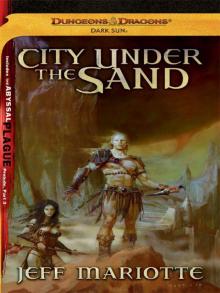 City Under the Sand
City Under the Sand The Burning Season
The Burning Season Sanctuary
Sanctuary Winds of the Wild Sea
Winds of the Wild Sea Serpents in the Garden
Serpents in the Garden Close to the Ground
Close to the Ground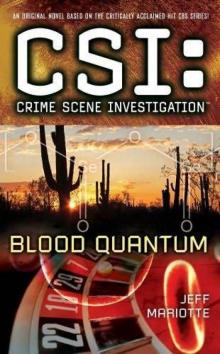 Blood Quantum
Blood Quantum Brass in Pocket
Brass in Pocket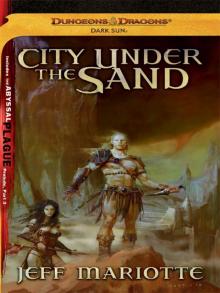 City Under the Sand: A Dark Sun Novel (Dungeons & Dragons: Dark Sun)
City Under the Sand: A Dark Sun Novel (Dungeons & Dragons: Dark Sun)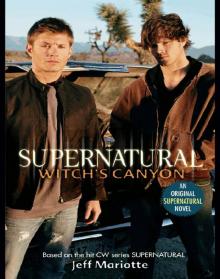 Witch's Canyon
Witch's Canyon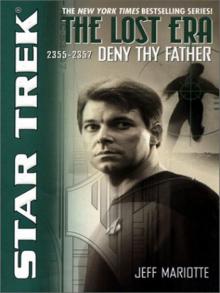 STAR TREK: The Lost Era - 2355-2357 - Deny Thy Father
STAR TREK: The Lost Era - 2355-2357 - Deny Thy Father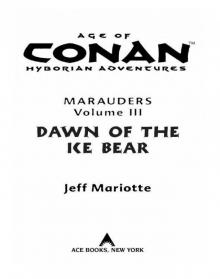 Dawn of the Ice Bear
Dawn of the Ice Bear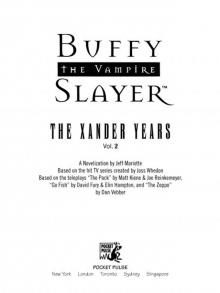 The Xander Years, Vol.2
The Xander Years, Vol.2 Ghost of the Wall
Ghost of the Wall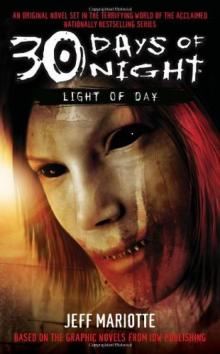 30 Days of Night: Light of Day
30 Days of Night: Light of Day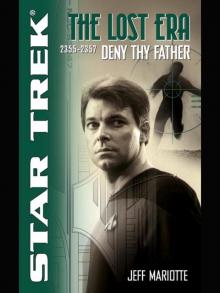 Deny Thy Father
Deny Thy Father Criminal Minds
Criminal Minds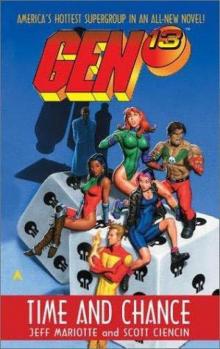 Time and Chance
Time and Chance The Folded World
The Folded World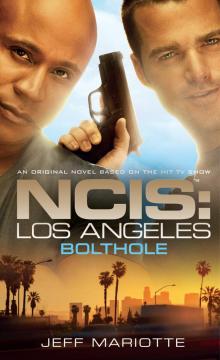 Bolthole
Bolthole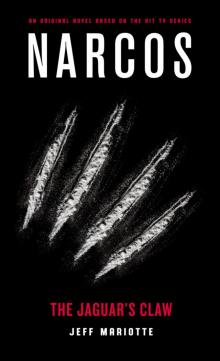 Narcos
Narcos Right to Die
Right to Die